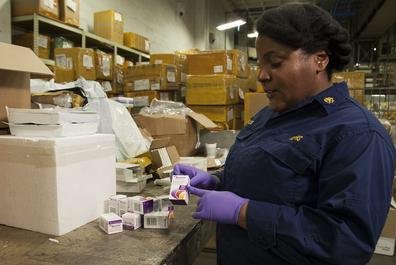The U.S. Food and Drug Administration has suspended foreign inspections through April amid the coronavirus pandemic. Photo courtesy of the FDA
EVANSVILLE, Ind., March 19 (UPI) -- Concerns are growing that the safety and efficacy of imported medical supplies might deteriorate, now that the United States has halted inspections at foreign drug manufacturing facilities.
The Food and Drug Administration last week suspended its inspections of thousands of international plants that supply the United States with critical drugs and medical supplies through April due to travel restrictions amid the coronavirus pandemic.
The lack of oversight increases the likelihood that issues with poor sanitation or inadequate product testing could go unnoticed and uncorrected, consumer safety advocates say.
"The FDA has said they will use other procedures to ensure the products entering the U.S. are safe, but I don't know how they can do that," said Michael Carome, the director of the Public Citizen Health Research Group, a consumer advocacy group.
"Only an onsite inspector will see things like rodent feces all over the floor of a factory, or that the machinery is not being sanitized. A company is not going to tell you that."
More than 70 percent of the active pharmaceutical ingredients and more than half the finished medications consumed in the United States are produced overseas, according to Janet Woodcock, the director of the FDA's Center for Drug Evaluation and Research.
Of the active ingredients, the largest amount -- 26 percent -- is produced in the European Union, according to Woodcock. India is next, producing 18 percent, while China produces 13 percent.
In 2019, the FDA's 200 inspectors conducted some 966,000 international site visits. The agency reported safety violations at about 9 percent of those sites. India was the biggest offender, with violations at 17 percent of its inspected plants.
Many of the violations involved inadequate -- or nonexistent -- product testing, Carome said. Plants are required by FDA to test their products before and after production to ensure they contain the appropriate amount the active ingredients and are free of contaminants.
Other common violations involve improper factory sanitation, Carome said. In 2017, for example, an inspector touring a Chinese drug manufacturing plant found rodent feces throughout the facility, including areas where the drugs were manufactured and stored.
That facility, Bicooya Cosmetics Limited, supplied ingredients for products sold in Dollar Tree stores, the FDA said.
When inspectors find such issues, the FDA can then block the import of products produced at those facilities until the issues are resolved.
"Now, they've suspended all inspections," Carome said. "While that is understandable, it does raise real concerns about the safety of drugs and medical devices coming into the U.S."
Foreign facilities that process food for American export are more commonly inspected by third-party auditors who have been accredited by the FDA, said Howard Sklamberg, a former FDA deputy commissioner for global regulatory operations and policy. It's unclear whether this inspections will continue through the outbreak.
Beyond safety and quality concerns, some in the medical field fear the freeze on foreign inspections could impact the United States' ability to obtain medical supplies.
The FDA requires any new manufacturing plant to pass an inspection before it can send medicines and medical supplies to the United States.
"If a company changes manufacturers, that requires FDA approval," said Mike Heyl, a partner at the law firm Hogan Lovells, who helps medical supply manufacturers comply with FDA regulations. "We've already had a number of cases where applications are delayed."
What's more concerning, Heyl said, is what will happen when an overseas manufacturing facility has to shut and change locations because the plant has been contaminated by coronavirus.
"If suddenly a plant needs to move, that requires an inspection," Heyl said. "How do we get those?"
In a statement announcing the decision to suspend inspections, FDA Commissioner Stephen Hahn said that foreign inspections that are "deemed mission-critical will still be considered on a case-by-case basis."
"We are aware of how this action may impact other FDA responsibilities, including product application reviews," Hahn said. "We will be vigilant and monitor the situation very closely."
The other type of inspection, known as a "for cause inspection," is conducted if the FDA has reason to suspect an issue with a medicine or medical device, former deputy commissioner Sklamberg said.
The FDA has several workarounds in lieu of on site inspections, Hahn said. One is to simply deny entry to "unsafe products."
The agency also will physically examine and or sample products at the border, he said.
"Is that a good thing [inspections are suspended]? No," Sklamberg said, who is now a partner at the Akin Gump law firm. "But is it a cause for alarm? No. Now, if you delay it long enough, it will have an impact. I don't know where that line is, but the longer it goes on, the greater the incremental risk."















